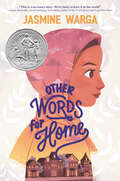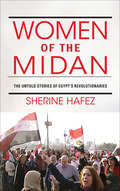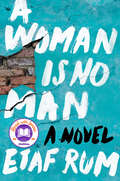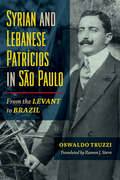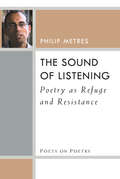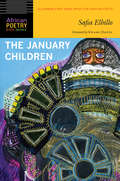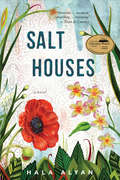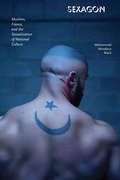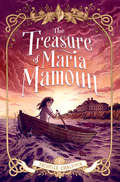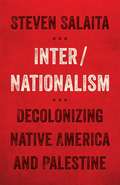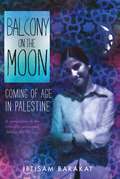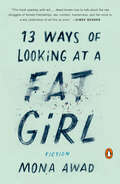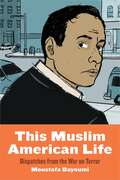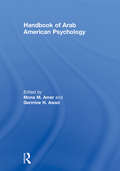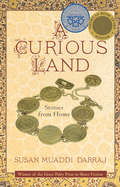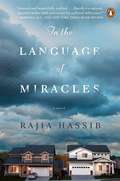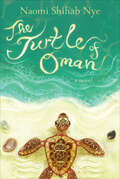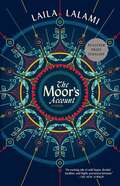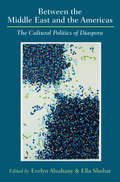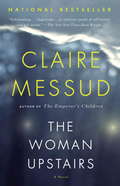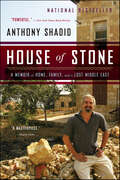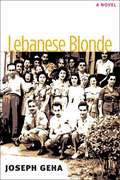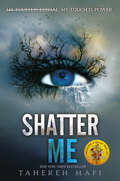Special Collections
Arab American Book Award
- Table View
- List View
Other Words for Home
by Jasmine WargaA gorgeously written, hopeful middle grade novel in verse about a young girl who must leave Syria to move to the United States, perfect for fans of Jason Reynolds and Aisha Saeed.
Jude never thought she’d be leaving her beloved older brother and father behind, all the way across the ocean in Syria.
But when things in her hometown start becoming volatile, Jude and her mother are sent to live in Cincinnati with relatives.
At first, everything in America seems too fast and too loud. The American movies that Jude has always loved haven’t quite prepared her for starting school in the US—and her new label of “Middle Eastern,” an identity she’s never known before.
But this life also brings unexpected surprises—there are new friends, a whole new family, and a school musical that Jude might just try out for. Maybe America, too, is a place where Jude can be seen as she really is.
This lyrical, life-affirming story is about losing and finding home and, most importantly, finding yourself.
A New York Times Bestseller
Women of the Midan
by Sherine HafezAn exploration of gender, the Arab Spring, and women&’s experiences of revolution, including firsthand accounts. In Women of the Midan, Sherine Hafez demonstrates how women were a central part of revolutionary process of the Arab Spring. Women not only protested in the streets of Cairo, they demanded democracy, social justice, and renegotiation of a variety of sociocultural structures. Women&’s resistance to state control, Islamism, neoliberal market changes, the military establishment, and patriarchal systems forged new paths of dissent and transformation. Through firsthand accounts of women who participated in the revolution, Hafez illustrates how the gendered body signifies collective action and the revolutionary narrative. Using the concept of rememory, Hafez shows how the body is inseparably linked to the trauma of the revolutionary struggle. While delving into the complex weave of public space, government control, masculinity, and religious and cultural norms, Hafez sheds light on women&’s relationship to the state in the Arab world today and how the state, in turn, shapes individuals and marks gendered bodies.
A Woman Is No Man
by Etaf RumA Goodreads Choice Awards Finalist for Best Fiction and Best Debut • BookBrowse's Best Book of the Year • A Marie Claire Best Women's Fiction of the Year • A Real Simple Best Book of the Year • A PopSugar Best Book of the Year • A New York Times Book Review Editors’ Choice • A Washington Post 10 Books to Read in March • A Newsweek Best Book of the Summer • A USA Today Best Book of the Week • A Washington Book Review Difficult-To-Put-Down Novel • A Refinery 29 Best Books of the Month • A Buzzfeed News 4 Books We Couldn't Put Down Last Month • A New Arab Best Books by Arab Authors • An Electric Lit 20 Best Debuts of the First Half of 2019 • A The Millions Most Anticipated Books of the Year“Garnering justified comparisons to Khaled Hosseini’s A Thousand Splendid Suns... Etaf Rum’s debut novel is a must-read about women mustering up the bravery to follow their inner voice.” —Refinery 29The New York Times bestseller and Read with Jenna TODAY SHOW Book Club pick telling the story of three generations of Palestinian-American women struggling to express their individual desires within the confines of their Arab culture in the wake of shocking intimate violence in their community."Where I come from, we’ve learned to silence ourselves. We’ve been taught that silence will save us. Where I come from, we keep these stories to ourselves. To tell them to the outside world is unheard of—dangerous, the ultimate shame.”Palestine, 1990. Seventeen-year-old Isra prefers reading books to entertaining the suitors her father has chosen for her. Over the course of a week, the naïve and dreamy girl finds herself quickly betrothed and married, and is soon living in Brooklyn. There Isra struggles to adapt to the expectations of her oppressive mother-in-law Fareeda and strange new husband Adam, a pressure that intensifies as she begins to have children—four daughters instead of the sons Fareeda tells Isra she must bear.Brooklyn, 2008. Eighteen-year-old Deya, Isra’s oldest daughter, must meet with potential husbands at her grandmother Fareeda’s insistence, though her only desire is to go to college. Deya can’t help but wonder if her options would have been different had her parents survived the car crash that killed them when Deya was only eight. But her grandmother is firm on the matter: the only way to secure a worthy future for Deya is through marriage to the right man.But fate has a will of its own, and soon Deya will find herself on an unexpected path that leads her to shocking truths about her family—knowledge that will force her to question everything she thought she knew about her parents, the past, and her own future.
Syrian and Lebanese Patricios in Sao Paulo
by Oswaldo TruzziSyrian and Lebanese immigrants to Brazil chose to settle in urban areas, a marked contrast to many other migrant groups. In São Paulo, these newcomers embraced new lives as merchants, shopkeepers, and industrialists that made them a dominant force in the city's business sector. Oswaldo Truzzi's original work on these so-called patrícios changed the face of Brazilian studies. Now available in an English translation, Truzzi's pioneering book identifies the complex social paths blazed by Syrian and Lebanese immigrants and their descendants from the 1890s to the 1960s. He considers their relationships to other groups within São Paulo's kaleidoscopic mix of cultures. He also reveals the differences--real and perceived--between Syrians and Lebanese in terms of religious and ethnic affinities and in the economic sphere. Finally, he compares the two groups with their counterparts in the United States and looks at the wave of Lebanese Muslims to São Paulo that began in the 1960s.
The Sound of Listening
by Philip MetresPhilip Metres stakes a claim for the cultural work that poems can perform—from providing refuge to embodying resistance, from recovering silenced voices to building a more just world, in communities of solitude and solidarity. Gathering a decade of his writing on poetry, he widens our sense of poetry as a way of being in the world, proposing that poems can offer a permeability to marginalized voices and a shelter from the imperial noise and despair that can silence us. The Sound of Listening ranges between expansive surveys of the poetry of 9/11, Arab American poetry, documentary poetry, landscape poetry, installation poetry, and peace poetry; personal explorations of poets such as Adrienne Rich, Khalil Gibran, Lev Rubinstein, and Arseny Tarkovsky; and intimate dialogues with Randa Jarrar, Fady Joudah, and Micah Cavaleri, that illuminate Metres’s practice of listening in his 2015 work, Sand Opera.
Mirage
by Somaiya DaudThis “enriching, thrilling, and captivating” (BuzzFeed) Moroccan-inspired debut “has what it takes to be the next big thing in sci-fi/fantasy” (SLJ, starred review)!In a world dominated by the brutal Vathek empire, eighteen-year-old Amani is a dreamer. She dreams of what life was like before the occupation; she dreams of writing poetry like the old-world poems she adores; she dreams of receiving a sign from Dihya that one day, she, too, will have adventure, and travel beyond her isolated home.But when adventure comes for Amani, it is not what she expects: she is kidnapped by the regime and taken in secret to the royal palace, where she discovers that she is nearly identical to the cruel half-Vathek Princess Maram. The princess is so hated by her conquered people that she requires a body double, someone to appear in public as Maram, ready to die in her place.As Amani is forced into her new role, she can’t help but enjoy the palace’s beauty—and her time with the princess’ fiancé, Idris. But the glitter of the royal court belies a world of violence and fear. If Amani ever wishes to see her family again, she must play the princess to perfection...because one wrong move could lead to her death.
The January Children
by Kwame Dawes and Safia ElhilloIn her dedication Safia Elhillo writes, “The January Children are the generation born in Sudan under British occupation, where children were assigned birth years by height, all given the birth date January 1.”
What follows is a deeply personal collection of poems that describe the experience of navigating the postcolonial world as a stranger in one’s own land.
The January Children depicts displacement and longing while also questioning accepted truths about geography, history, nationhood, and home. The poems mythologize family histories until they break open, using them to explore aspects of Sudan’s history of colonial occupation, dictatorship, and diaspora.
Several of the poems speak to the late Egyptian singer Abdelhalim Hafez, who addressed many of his songs to the asmarani—an Arabic term of endearment for a brown-skinned or dark-skinned person. Elhillo explores Arabness and Africanness and the tensions generated by a hyphenated identity in those two worlds. No longer content to accept manmade borders, Elhillo navigates a new and reimagined world.
Maintaining a sense of wonder in multiple landscapes and mindscapes of perpetually shifting values, she leads the reader through a postcolonial narrative that is equally terrifying and tender, melancholy and defiant.
Salt Houses
by Hala AlyanOn the eve of her daughter Alia’s wedding, Salma reads the girl’s future in a cup of coffee dregs. She sees an unsettled life for Alia and her children; she also sees travel, and luck. While she chooses to keep her predictions to herself that day, they will all soon come to pass when the family is uprooted in the wake of the Six-Day War of 1967.
Salma is forced to leave her home in Nablus; Alia’s brother gets pulled into a politically militarized world he can’t escape; and Alia and her gentle-spirited husband move to Kuwait City, where they reluctantly build a life with their three children.
When Saddam Hussein invades Kuwait in 1990, Alia and her family once again lose their home, their land, and their story as they know it, scattering to Beirut, Paris, Boston, and beyond.
Soon Alia’s children begin families of their own, once again navigating the burdens (and blessings) of assimilation in foreign cities.
Lyrical and heartbreaking, Salt Houses is a remarkable debut novel that challenges and humanizes an age-old conflict we might think we understand—one that asks us to confront that most devastating of all truths: you can’t go home again.
Sexagon
by Mehammed Amadeus MackIn contemporary France, particularly in the banlieues of Paris, the figure of the young, virile, hypermasculine Muslim looms large. So large, in fact, it often supersedes liberal secular society’s understanding of gender and sexuality altogether. Engaging the nexus of race, gender, nation, and sexuality, Sexagon studies the broad politicization of Franco-Arab identity in the context of French culture and its assumptions about appropriate modes of sexual and gender expression, both gay and straight.
Surveying representations of young Muslim men and women in literature, film, popular journalism, television, and erotica as well as in psychoanalysis, ethnography, and gay and lesbian activist rhetoric, Mehammed Amadeus Mack reveals the myriad ways in which communities of immigrant origin are continually and consistently scapegoated as already and always outside the boundary of French citizenship regardless of where the individuals within these communities were born. At the same time, through deft readings of—among other things—fashion photography and online hook-up sites, Mack shows how Franco-Arab youth culture is commodified and fetishized to the point of sexual fantasy. Official French culture, as Mack suggests, has judged the integration of Muslim immigrants from North and West Africa—as well as their French descendants—according to their presumed attitudes about gender and sexuality. More precisely, Mack argues, the frustrations consistently expressed by the French establishment in the face of the alleged Muslim refusal to assimilate is not only symptomatic of anxieties regarding changes to a “familiar” France but also indicative of an unacknowledged preoccupation with what Mack identifies as the “virility cultures” of Franco-Arabs, rendering Muslim youth as both sexualized objects and unruly subjects.
The perceived volatility of this banlieue virility serves to animate French characterizations of the “difficult” black, Arab, and Muslim boy—and girl—across a variety of sensational newscasts and entertainment media, which are crucially inflamed by the clandestine nature of the banlieues themselves and non-European expressions of virility. Mirroring the secret and underground qualities of “illegal” immigration, Mack shows, Franco-Arab youth increasingly choose to withdraw from official scrutiny of the French Republic and to thwart its desires for universalism and transparency. For their impenetrability, these sealed-off domains of banlieue virility are deemed all the more threatening to the surveillance of mainstream French society and the state apparatus.
The Treasure of Maria Mamoun
by Michelle ChalfounTwelve-year-old Maria lives a lonely, latchkey-kid's life in the Bronx. Her Lebanese mother is working two nursing jobs to keep them afloat, and Maria keeps her worries to herself, not wanting to be a burden. Then something happens one day between home and school that changes everything. Mom whisks them to an altogether different world on Martha's Vineyard, where she's found a job on a seaside estate. While the mysterious bedridden owner--a former film director--keeps her mother busy, Maria has the freedom to explore a place she thought could only exist in the movies. Making friends with a troublesome local character, Maria finds an old sailboat that could make a marvelous clubhouse. She also stumbles upon an old map that she is sure will lead to pirate's plunder--but golden treasure may not be the most valuable thing she discovers for herself this special summer.
Inter/Nationalism
by Steven SalaitaAccording to Steven Salaita, the seemingly disparate fields of Palestinian Studies and American Indian studies have more in common than one may think.
In Inter/Nationalism, Salaita argues that American Indian and Indigenous studies must be more central to the scholarship and activism focusing on Palestine. Salaita offers a fascinating inside account of the Boycott, Divestment, and Sanctions (BDS) movement--which, among other things, aims to end Israel's occupation of Palestinian land.
In doing so, he emphasizes BDS's significant potential as an organizing entity as well as its importance in the creation of intellectual and political communities that put Natives and other colonized peoples such as Palestinians into conversation.
His discussion includes readings of a wide range of Native poetry that invokes Palestine as a theme or symbol; the speeches of U.S. President Andrew Jackson and early Zionist thinker Ze'ev Jabotinsky; and the discourses of "shared values" between the United States and Israel.
Inter/Nationalism seeks to lay conceptual ground between American Indian and Indigenous studies and Palestinian studies through concepts of settler colonialism, indigeneity, and state violence.
By establishing Palestine as an indigenous nation under colonial occupation, this book draws crucial connections between the scholarship and activism of Indigenous America and Palestine.
Balcony on the Moon
by Ibtisam BakaratPicking up where Tasting the Sky left off, Balcony on the Moon follows Ibtisam Barakat through her childhood and adolescence in Palestine from 1972-1981 and chronicles her desire to be a writer. Ibtisam finds inspiration through writing letters to pen pals and from an adult who encourages her to keep at it, but the most surprising turn of all for Ibtisam happens when her mother decides that she would like to seek out an education, too. This memoir is a touching, at times funny, and enlightening look at the not often depicted daily life in a politically tumultuous area. A Margaret Ferguson Book
13 Ways of Looking at a Fat Girl
by Mona AwadGrowing up in the suburban hell of Misery Saga (a.k.a. Mississauga), Lizzie has never liked the way she looks--even though her best friend Mel says she's the pretty one. She starts dating guys online, but she's afraid to send pictures, even when her skinny friend China does her makeup: she knows no one would want her if they could really see her. So she starts to lose.
With punishing drive, she counts almonds consumed, miles logged, pounds dropped. She fights her way into coveted dresses. She grows up and gets thin, navigating double-edged validation from her mother, her friends, her husband, her reflection in the mirror. But no matter how much she loses, will she ever see herself as anything other than a fat girl?
In her brilliant, hilarious, and at times shocking debut, Mona Awad simultaneously skewers the body image-obsessed culture that tells women they have no value outside their physical appearance, and delivers a tender and moving depiction of a lovably difficult young woman whose life is hijacked by her struggle to conform.
As caustically funny as it is heartbreaking, 13 Ways of Looking at a Fat Girl introduces a vital new voice in fiction.
This Muslim American Life
by Moustafa BayoumiOver the last few years, Moustafa Bayoumi has been an extra in Sex and the City 2 playing a generic Arab, a terrorist suspect (or at least his namesake "Mustafa Bayoumi" was) in a detective novel, the subject of a trumped-up controversy because a book he had written was seen by right-wing media as pushing an "anti-American, pro-Islam" agenda, and was asked by a U.S. citizenship officer to drop his middle name of Mohamed.
Others have endured far worse fates. Sweeping arrests following the terrorist attacks of September 11, 2001 led to the incarceration and deportation of thousands of Arabs and Muslims, based almost solely on their national origin and immigration status. The NYPD, with help from the CIA, has aggressively spied on Muslims in the New York area as they go about their ordinary lives, from noting where they get their hair cut to eavesdropping on conversations in cafés.
In This Muslim American Life, Moustafa Bayoumi reveals what the War on Terror looks like from the vantage point of Muslim Americans, highlighting the profound effect this surveillance has had on how they live their lives. To be a Muslim American today often means to exist in an absurd space between exotic and dangerous, victim and villain, simply because of the assumptions people carry about you.
In gripping essays, Bayoumi exposes how contemporary politics, movies, novels, media experts and more have together produced a culture of fear and suspicion that not only willfully forgets the Muslim-American past, but also threatens all of our civil liberties in the present.
Handbook of Arab American Psychology
by Germine H. Awad and Mona M. AmerThe Handbook of Arab American Psychology is the first major publication to comprehensively discuss the Arab American ethnic group from a lens that is primarily psychological. This edited book contains a comprehensive review of the cutting-edge research related to Arab Americans and offers a critical analysis regarding the methodologies and applications of the scholarly literature. It is a landmark text for both multicultural psychology as well as for Arab American scholarship. Considering the post 9/11 socio-political context in which Arab Americans are under ongoing scrutiny and attention, as well as numerous misunderstandings and biases against this group, this text is timely and essential. Chapters in the Handbook of Arab American Psychology highlight the most substantial areas of psychological research with this population, relevant to diverse sub-disciplines including cultural, social, developmental, counseling/clinical, health, and community psychologies. Chapters also include content that intersect with related fields such as sociology, American studies, cultural/ethnic studies, social work, and public health. The chapters are written by distinguished scholars who merge their expertise with a review of the empirical data in order to provide the most updated presentation of scholarship about this population. The Handbook of Arab American Psychology offers a noteworthy contribution to the field of multicultural psychology and joins references on other racial/ethnic minority groups, including Handbook of African American Psychology, Handbook of Asian American Psychology, Handbook of U.S. Latino Psychology, and The Handbook of Chicana/o Psychology and Mental Health.
A Curious Land
by Susan Muaddi DarrajSusan Muaddi Darraj’s short story collection about the inhabitants of a Palestinian West Bank village, Tel al-Hilou, spans generations and continents to explore ideas of memory, belonging, connection, and, ultimately, the deepest and richest meaning of home. A Curious Land gives voice to the experiences of Palestinians in the last century.
An excerpt from A Curious Land:
When Rabab lowered the magad and clapped-clapped to the well in her mother’s too-big slippers, the stone jar digging into her shoulder, she didn’t, at first, see the body. The morning sun glazed everything around her—the cement homes, the iron rails along one wall, the bars on the windows, the stones around the well—and made her squint her itchy eyes.
She was hungry. That was all.
They’d arrived here only last night, stopping as soon as Awwad and the men were sure the army had moved south. It must have been the third time in just a few weeks—collapse the tents, load the mules, disappear into the sands. She hoped this war would end soon, and she didn’t really care who won, as long as it ended because they hadn’t eaten well in two years. In the past few months, her mother had sold all her gold, except for her bracelet made of liras. It was the only thing left, and she was holding onto it, and Rabab realized, so were they all; she imagined that, the day it was sold, when her mother’s wrist was bare, would signal that they were at the end.
In the Language of Miracles
by Rajia HassibFor readers of House of Sand and Fog, a mesmerizing debut novel of an Egyptian American family and the wrenching tragedy that tears their lives apart
Samir and Nagla Al-Menshawy appear to have attained the American dream. After immigrating to the United States from Egypt, Samir successfully works his way through a residency and launches his own medical practice as Nagla tends to their firstborn, Hosaam, in the cramped quarters of a small apartment. Soon the growing family moves into a big house in the manicured New Jersey suburb of Summerset, where their three children eventually attend school with Natalie Bradstreet, the daughter of their neighbors and best friends.
More than a decade later, the family's seemingly stable life is suddenly upended when a devastating turn of events leaves Hosaam and Natalie dead and turns the Al-Menshawys into outcasts in their own town.
Narrated a year after Hosaam and Natalie's deaths, Rajia Hassib's heartfelt novel follows the Al-Menshawys during the five days leading up to the memorial service that the Bradstreets have organized to mark the one-year anniversary of their daughter's death. While Nagla strives to understand her role in the tragedy and Samir desperately seeks reconciliation with the community, Khaled, their surviving son, finds himself living in the shadow of his troubled brother.
Struggling under the guilt and pressure of being the good son, Khaled turns to the city in hopes of finding happiness away from the painful memories home conjures. Yet he is repeatedly pulled back home to his grandmother, Ehsan, who arrives from Egypt armed with incense, prayers, and an unyielding determination to stop the unraveling of her daughter's family.
In Ehsan, Khaled finds either a true hope of salvation or the embodiment of everything he must flee if he is ever to find himself.
Writing with unflinchingly honest prose, Rajia Hassib tells the story of one family pushed to the brink by tragedy and mental illness, trying to salvage the life they worked so hard to achieve. The graceful, elegiac voice of In the Language of Miracles paints tender portraits of a family's struggle to move on in the wake of heartbreak, to stay true to its traditions, and above all else, to find acceptance and reconciliation
The Turtle of Oman
by Naomi Shihab NyePraised by the Horn Book as “both quiet and exhilarating,” this novel by the acclaimed poet and National Book Award Finalist Naomi Shihab Nye follows Aref Al-Amri as he says goodbye to everything and everyone he loves in his hometown of Muscat, Oman, as his family prepares to move to Ann Arbor, Michigan. This book was awarded a 2015 Middle East Book Award, was named a Notable Book by the American Library Association, and includes extra material by the author. Aref Al-Amri does not want to leave Oman. He does not want to leave his elementary school, his friends, or his beloved grandfather, Siddi. He does not want to live in Ann Arbor, Michigan, where his parents will go to graduate school. His mother is desperate for him to pack his suitcase, but he refuses. Finally, she calls Siddi for help. But rather than pack, Aref and Siddi go on a series of adventures. They visit the camp of a thousand stars deep in the desert, they sleep on Siddi's roof, they fish in the Gulf of Oman and dream about going to India, and they travel to the nature reserve to watch the sea turtles. At each stop, Siddi finds a small stone that he later slips into Aref's suitcase—mementos of home.Naomi Shihab Nye's warmth, attention to detail, and belief in the power of empathy and connection shines from every page. Features black-and-white spot art and decorations by Betsy Peterschmidt.
The Moor's Account
by Laila LalamiIn this sweeping historical saga of a young man's journey from successful merchant to slave to triumphant survivor, Laila Lalami has crafted "brilliantly imagined fiction...rewritten to give us something that feels very like the truth" (Salman Rushdie).
In 1527, the conquistador Pánfilo de Narváez left the port of San Lucar de Barrameda in Spain with a crew of more than five hundred men. His goal was to claim what is now the Gulf Coast of the United States for the Spanish crown and, in the process, become as wealthy and as famous as Hernán Cortés.
But from the moment the Narváez expedition reached Florida it met with incredibly bad luck - storms, disease, starvation, hostile Indians. Within a year, there were only four survivors: the expedition's treasurer, Cabeza de Vaca; a Spanish nobleman named Alonso del Castillo Maldonado; a young explorer by the name of Andrés Dorantes; and his Moroccan slave, Mustafa al-Zamori.
The four survivors were forced to live as slaves to the Indians for six years, before fleeing and establishing themselves as faith healers. Together, they traveled on foot through present-day Florida, Texas, New Mexico, and Arizona, gathering thousands of disciples and followers along the way. In 1536, they crossed the Rio Grande into Mexican territory, where they stumbled on a group of Spanish slavers, who escorted them to the capital of the Spanish empire, México-Tenochtitlán.
Three of the survivors were asked to provide testimony of their journey--Castillo, Dorantes, and Cabeza de Vaca, who later wrote a book about this adventure, called La Relacíon, or The Account. But because he was a slave, Estebanico was not asked to testify.
His experience was considered irrelevant, or superfluous, or unreliable, or unworthy, despite the fact that he had acted as a scout, an interpreter, and a translator.
This novel is his story.
A Kid's Guide to Arab American History
by Yvonne Wakim Dennis and Maha AddasiMany Americans, educators included, mistakenly believe all Arabs share the same culture, language, and religion, and have only recently begun immigrating to the United States.
A Kid's Guide to Arab American History dispels these and other stereotypes and provides a contemporary as well as historical look at the people and experiences that have shaped Arab American culture.
Each chapter focuses on a different group of Arab Americans including those of Lebanese, Syrian, Palestinian, Jordanian, Egyptian, Iraqi, and Yemeni descent and features more than 50 fun activities that highlight their distinct arts, games, clothing, and food.
Kids will love dancing the dabke, constructing a derbekke drum, playing a game of senet, making hummus, creating an arabesque design, and crafting an Egyptian-style cuff bracelet. Along the way they will learn to count in Kurdish, pick up a few Syrian words for family members, learn a Yemeni saying, and speak a little Iraqi.
Short biographies of notable Arab Americans, including actor and philanthropist Danny Thomas, singer Paula Abdul, artist Helen Zughaib, and activist Ralph Nader, demonstrate a wide variety of careers and contributions.
Between the Middle East and the Americas
by Ella and Alsultany and Evelyn and ShohatBetween the Middle East and the Americas: The Cultural Politics of Diaspora traces the production and circulation of discourses about "the Middle East" across various cultural sites, against the historical backdrop of cross-Atlantic Mahjar flows. The book highlights the fraught and ambivalent situation of Arabs/Muslims in the Americas, where they are at once celebrated and demonized, integrated and marginalized, simultaneously invisible and spectacularly visible. The essays cover such themes as Arab hip-hop's transnational imaginary; gender/sexuality and the Muslim digital diaspora; patriotic drama and the media's War on Terror; the global negotiation of the Prophet Mohammad cartoons controversy; the Latin American paradoxes of Turcophobia/Turcophilia; the ambiguities of the bellydancing fad; French and American commodification of Rumi spirituality; the reception of Iranian memoirs as cultural domestication; and the politics of translation of Turkish novels into English. Taken together, the essays analyze the hegemonic discourses that position "the Middle East" as a consumable exoticized object, while also developing complex understandings of self-representation in literature, cinema/TV, music, performance, visual culture, and digital spaces. Charting the shifting significations of differing and overlapping forms of Orientalism, the volume addresses Middle Eastern diasporic practices from a transnational perspective that brings postcolonial cultural studies methods to bear on Arab American studies, Middle Eastern studies, and Latin American studies. Between the Middle East and the Americas disentangles the conventional separation of regions, moving beyond the binarist notion of "here" and "there" to imaginatively reveal the thorough interconnectedness of cultural geographies.
The Woman Upstairs
by Claire MessudNora Eldridge, a 37-year-old elementary school teacher in Cambridge, Massachusetts, is on the verge of disappearing. Having abandoned her desire to be an artist, she has become the "woman upstairs," a reliable friend and tidy neighbour always on the fringe of others' achievements. Then into her classroom walks a new pupil, Reza Shahid, a child who enchants as if from a fairy tale. He and his parents--dashing Skandar, a half-Muslim Professor of Ethical History born in Beirut, and Sirena, an effortlessly glamorous Italian artist--have come to America for Skandar to teach at Harvard.But one afternoon, Reza is attacked by schoolyard bullies who punch, push and call him a "terrorist," and Nora is quickly drawn deep into the complex world of the Shahid family. Soon she finds herself falling in love with them, separately and together. Nora's happiness explodes her boundaries--until Sirena's own ambition leads to a shattering betrayal.Written with intimacy and piercing emotion, this urgently dispatched story of obsession and artistic fulfillment explores the thrill--and the devastating cost--of giving in to one's passions. The Woman Upstairs is a masterly story of America today, of being a woman and of the exhilarations of love.
House of Stone
by Anthony Shadid“Wonderful . . . One of the finest memoirs I’ve read.” — Philip Caputo, Washington PostIn the summer of 2006, racing through Lebanon to report on the Israeli invasion, Anthony Shadid found himself in his family’s ancestral hometown of Marjayoun. There, he discovered his great-grandfather’s once magnificent estate in near ruins, devastated by war. One year later, Shadid returned to Marjayoun, not to chronicle the violence, but to rebuild in its wake.So begins the story of a battle-scarred home and a journalist’s wounded spirit, and of how reconstructing the one came to fortify the other. In this bittersweet and resonant memoir, Shadid creates a mosaic of past and present, tracing the house’s renewal alongside the history of his family’s flight from Lebanon and resettlement in America around the turn of the twentieth century. In the process, he memorializes a lost world and provides profound insights into a shifting Middle East. This paperback edition includes an afterword by the journalist Nada Bakri, Anthony Shadid’s wife, reflecting on his legacy.“A poignant dedication to family, to home, and to history . . . Breathtaking.” — San Francisco Chronicle“Entertaining, informative, and deeply moving . . . House of Stone will stand a long time, for those fortunate enough to read it.” — Telegraph (London)
Lebanese Blonde
by Joseph GehaLebanese Blonde takes place in 1975-76 at the beginning of Lebanon's sectarian civil war.
Set primarily in the Toledo, Ohio, "Little Syria" community, it is the story of two immigrant cousins: Aboodeh, a self-styled entrepreneur; and Samir, his young, reluctant accomplice.
Together the two concoct a scheme to import Lebanese Blonde, a potent strain of hashish, into the United States, using the family's mortuary business as a cover.
When Teyib, a newly arrived war refugee, stumbles onto their plans, his clumsy efforts to gain acceptance raise suspicion. Who is this mysterious "cousin," and what dangers does his presence pose?
Aboodeh and Samir's problems grow still more serious when a shipment goes awry and their links to the war-ravaged homeland are severed.
Soon it's not just Aboodeh and Samir's livelihoods and futures that are imperiled, but the stability of the entire family.
Shatter Me
by Tahereh Mafi"You can't touch me," I whisper. I'm lying, is what I don't tell him. He can touch me, is what I'll never tell him. But things happen when people touch me. Strange things. Bad things. No one knows why Juliette's touch is fatal, but The Reestablishment has plans for her. Plans to use her as a weapon. But Juliette has plans of her own. After a lifetime without freedom, she's finally discovering a strength to fight back for the very first time-and to find a future with the one boy she thought she'd lost forever.
